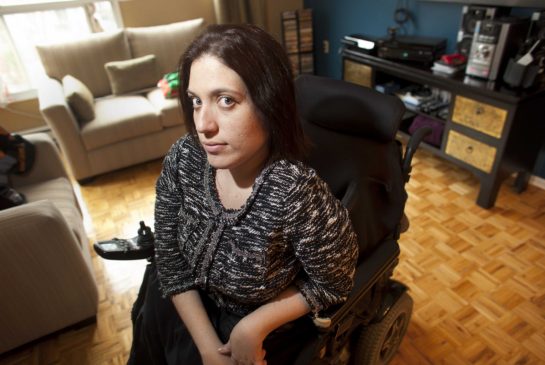BLOG

April 16, 2013
Toronto cab companies agree to stop illegal extra charges for wheelchair passengers
Four Toronto cab companies have agreed to discipline drivers who charge wheelchair passengers more than the metered fare.
Alessia Di Virgilio’s human-rights complaint has spurred cab companies to change their rules surrounding rates for wheelchair passengers.
Human rights advocates are lauding a decision by some of the city’s biggest cab companies to crack down on drivers who illegally charge wheelchair passengers more than the metered rate.
“This is a really significant settlement because it involves four major taxi companies — a significant portion of the taxi industry in Toronto,” said human rights lawyer Clara Matheson. “It’s a settlement about inclusion and accountability. And about a really fundamental service which is transportation.”
The settlement came four years after Toronto resident Alessia Di Virgilio complained to the Human Rights Tribunal of Ontario that drivers of wheelchair-accessible cabs (the vehicles with ramps) routinely charged a $25 to $35 flat rate for a fare that could be as short as “around the block.” Fares were often two and three time the normal amount, she said, a widespread practice in the industry.
Cab drivers are allowed to charge only the metered fare under Toronto’s municipal code.
The extreme financial burden limited Di Virgilio’s ability to access on-demand service. Wheel-Trans, which is available for a single TTC fare, must be booked in advance.
The companies — Royal, Beck, Co-Op and Scarborough Taxi — have also agreed to ask the city that tariff and bill of rights notices in taxis reflect the prohibited fares and that the information be included in training for drivers.
The companies will also post notices in dispatch offices and institute a driver disciplinary system ranging from warnings to termination. Passengers who complain will be able to find out what action was taken.
Di Virgilio said cab drivers told her the higher rates were due to the increased expense of maintaining and servicing an accessible vehicle.
No one from the cab companies was available to comment.
The city is currently reviewing the cab industry and has held 22 consultations, six of them about people with disabilities.
“We certainly heard that this is an issue,” said Vanessa Fletcher, project manager of the review. “And it’s exacerbated by the fact that we don’t have a lot of accessible taxi cabs in Toronto.”
Of the 173 accessible licences in Toronto, 164 are available to Wheel-Trans through contracts with three different companies.
“It’s a great service and I do use it a lot, but it can’t be the only solution,” said Di Virgilio, 33, who has been in a wheelchair her entire life. “That’s why this decision is so important.”
The city will issue an on-demand accessible wheelchair strategy when it releases its review this spring.
The initial human rights complaint named a fifth Toronto taxi firm. But it refused to settle because it’s accessible service was provided by a third party, which is common in the industry, and it wasn’t responsible.
“This is a really widespread practice,” said Jennifer Ramsay, a spokeswoman for the Human Rights Legal Support Centre, which provides legal representation in cases such as this. “We hope that the publicity will encourage other cab companies to ensure their drivers aren’t doing this.”
By: Patty Winsa News reporter, Published on Tue Apr 16 2013
See the original article from thestar.com HERE

